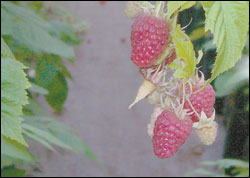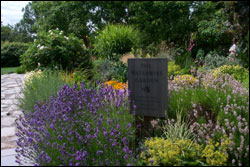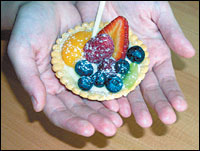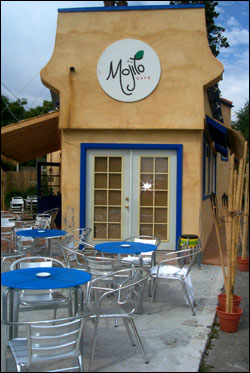“MY BERRIES ARE beyond organic,” declares Tom Wood, owner of Raspberry Rich Farm as he shows me around his Centralia, Wash., greenhouses. Beyond organic? How can Wood’s blueberries, strawberries, and six varieties of raspberries be any more organic than the berries labeled as organic at roadside stands or the farmers market?
Wood says the secret is that he grows his berries hydroponically: without soil, in five-gallon plastic bags filled with a mixture of peat moss and perlite, whose exact blend he won’t reveal. Indoor hydroponic cultivation is a cutting-edge agricultural technique. From tomatoes to English cucumbers to salad greens to yes, even B.C. bud, more and more premium crops are being grown without soil, in greenhouses or completely indoors under artificial lighting. And this would be of no interest to food lovers but for one fact: Wood’s berries are the finest, best tasting berries I’ve ever had.
Wood says hydroponic crops experience accelerated growth, and owing to their controlled environment, don’t require the use of pesticides or other chemicals, something outdoor organic farmers can’t claim.
The Washington State Department of Agriculture has developed strict standards as to what can and can’t be labeled organic, but there are numerous chemicals that are approved, such as copper sulfate and chlorine, both toxic to humans. The state guidelines also permit the use of Bacillus thuringiensis, commonly know as Bt, as an insecticide. “We’ve got nothing on our berries,” Wood says as he picks one and passes it to me to enjoy. “You can eat mine right off the bush with no worries.”
Rather than pesticides, Wood relies on an army of predatory insects: lady bugs, praying mantises, and mites, which spend their lives chasing down and consuming pests that otherwise would have to be controlled through chemical means. He also has 10 beehives to pollinate his berry blossoms for year-round yields.
“We broke the code on berries,” he says. Through years of experimentation and low-tech innovation, Wood has learned to trick the berry plants into thinking they are undergoing the natural rhythms of seasonal change. He uses surplus refrigerator trucks to simulate winter, and the inherent warmth of his greenhouses to stand in for summer. His ability to deliver fruit year round has helped Wood carve a niche in Olympia markets. His berries are currently available at Olympia Top Foods stores under his Raspberry Rich brand, as well as directly from Wood at the Olympia farmers market on weekends. Wood plans to introduce his berries to the Seattle market in October, and one day sell them at the Pike Place Market.
Wood has spent the last 20 years breeding plants. He graduated from Oregon State University in 1974 with a degree in forestry and worked for several years as a lumberjack. He then became a carpenter (still his day job) and began breeding fuchsias to landscape his yard. He developed his peat and perlite mix for fuchsias, which grew at such astronomical rates he began growing them commercially, then expanded to lilies and tomatoes, always staying with his hydroponic medium and methods.
“I’m way out in left field on this stuff,” Wood says. But he is happy to be bucking the status quo if it means not using chemicals of any sort and delivering consistently high-quality fruit year round. Main thing: “We have the best berries,” says Wood. After tasting one of his huge, fragrant golden raspberries, you’ll agree he isn’t stretching the truth a millimeter.








